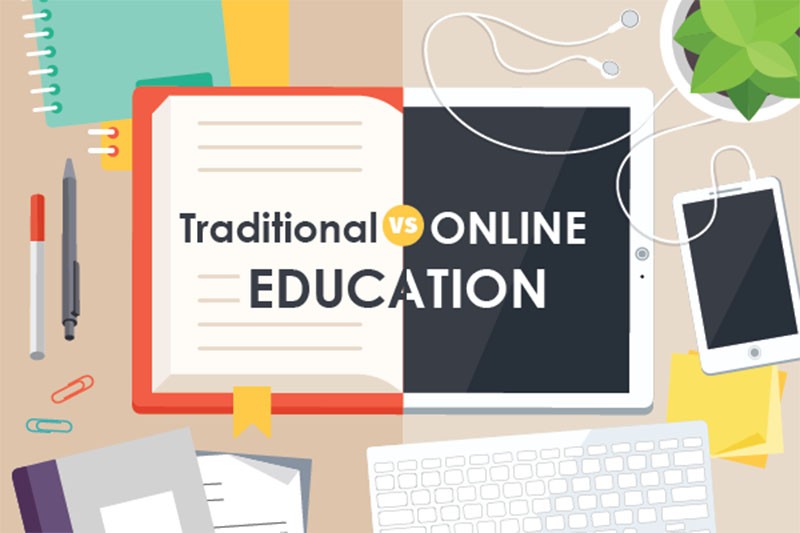As the world rapidly changes, education has evolved to meet diverse needs and lifestyles. The debate between online and traditional education has become more relevant, especially as students and professionals seek flexible learning options. Whether you’re considering enrolling in a new course or upgrading your skills, it’s important to understand the differences between these two paths. In this article, we’ll look at the advantages and disadvantages of both online and traditional education, helping you determine which approach best suits your needs.
What Is Online Education? Online education involves learning through digital platforms, where students access courses, lectures, and assignments via the internet. Platforms like Coursera, Udemy, and university-supported sites like edX have fueled the growth of this learning mode. The ability to learn from anywhere has made online education an attractive choice for students around the world.
What Is Traditional Education? Traditional education refers to in-person learning, where students physically attend classes in schools, colleges, or universities. This method emphasizes face-to-face interaction with teachers and peers, fostering a more hands-on approach to learning.
Advantages of Online Education Flexibility and Convenience One of the biggest benefits of online education is its flexibility. You can learn at your own pace and schedule, making it ideal for those juggling work, family, or living in remote areas.
Cost-Effective Learning Online courses are often more affordable since they eliminate the need for physical classrooms, saving on tuition, commuting, and housing expenses.
Access to Global Resources With online education, you’re not limited by geography. You can take courses from instructors worldwide, offering a broader range of expertise and knowledge.
Variety of Programs Online education provides a vast selection of programs, from short courses to full degrees, allowing you to choose what fits your interests and career goals.
Advantages of Traditional Education Face-to-Face Interaction In traditional education, students benefit from in-person interactions with teachers and classmates, fostering collaboration, relationship-building, and deeper engagement.
Structure and Discipline Traditional education follows a set schedule, offering structure that can help students remain focused and disciplined, which is beneficial for those who struggle with self-motivation.
Campus Life and Extracurricular Activities Campus life is a significant part of the traditional education experience, providing access to clubs, sports, and social events that enrich the academic journey.
Access to Physical Resources In-person learning gives students access to facilities like libraries, labs, and hands-on learning environments, which are crucial for subjects requiring practical work.
Challenges of Online Education Lack of Personal Interaction Online learning lacks the face-to-face interactions that come with traditional education, limiting spontaneous discussions and personal connections.
Self-Discipline and Motivation Online learning demands high levels of self-discipline and time management, which can be challenging without the structure of in-person classes.
Technical Issues Online education relies on technology, meaning issues like poor internet connectivity or outdated devices can hinder learning.
Challenges of Traditional Education Limited Flexibility Traditional education’s fixed schedules may not be suitable for those with jobs, family commitments, or who live far from campus.
Higher Costs The cost of traditional education can be higher due to tuition, accommodation, commuting, and other related expenses.
Geographic Constraints Attending a traditional institution often requires physical presence, which can be difficult for those living far from their desired school.
Comparing Social Experiences Social Interactions in Online Learning While online platforms offer tools like video conferencing and chat forums to encourage interaction, they cannot fully replace the social experiences of in-person learning.
Social Life in Traditional Education Traditional education offers a vibrant campus culture with clubs, activities, and events that allow students to form lifelong friendships and connections.
Job Market and Career Prospects How Employers View Online Degrees Online degrees are increasingly accepted by employers, particularly when earned from accredited institutions, but it’s essential to choose reputable programs.
How Employers View Traditional Degrees Traditional degrees are still highly regarded, especially in fields where hands-on experience is critical.
Learning Styles and Personal Preferences Self-Learners vs. Classroom Learners If you prefer learning independently at your own pace, online education may be better for you. However, if you thrive in a structured, interactive environment, traditional education might be a better fit.
Introverts vs. Extroverts Online learning can be more comfortable for introverts, while extroverts may prefer the social and group activities found in traditional education.
Blended Learning: A Middle Ground What Is Blended Learning? Blended learning combines both online and traditional education, offering the flexibility of online courses with the benefits of face-to-face interaction.
Pros of Blended Learning Blended learning accommodates different learning styles and schedules, making it an ideal option for those who want a balanced approach.
The Future of Education: Online vs. Traditional Shifting Trends Post-Pandemic The COVID-19 pandemic accelerated the adoption of online education, and many institutions continue to expand their online offerings, indicating that online learning is here to stay.
Long-Term Viability of Traditional Education Despite the growth of online education, traditional learning remains valuable, especially for programs requiring practical, hands-on training.
Online Education vs. Traditional: Which Is Right for You? Assessing Your Learning Preferences Consider your learning preferences—do you value flexibility and self-paced study, or do you need the structure and interaction of traditional classrooms?
Evaluating Your Career Goals Think about your career objectives. Some professions require hands-on experience, making traditional education more beneficial, while others may value the skills acquired through online learning.
Conclusion Both online and traditional education offer unique benefits and challenges. Your choice should depend on your personal preferences, lifestyle, and career goals. Whether you choose one or combine both, the key is to find the learning environment that best supports your success.
FAQs
- Can online education fully replace traditional education? Not completely. While online education offers flexibility, traditional education provides hands-on experiences that are hard to replicate.
- Is online education easier than traditional education? It depends. Online education requires more self-discipline, while traditional education offers more structure and guidance.
- Do employers respect online degrees? Yes, particularly when earned from accredited institutions. Many employers are recognizing the value of online education.
- How do I stay motivated in an online program? Set goals, create a study schedule, and use tools like planners to stay on track. Engaging with online study groups can also help.
- What should I consider when choosing between online and traditional education? Think about your lifestyle, learning preferences, and career goals when deciding between online and traditional education.





